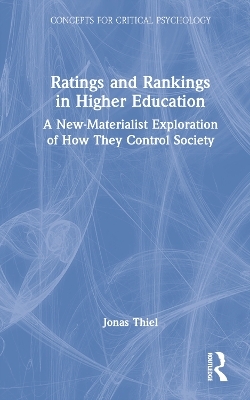
Ratings and Rankings in Higher Education
A New-Materialist Exploration of How They Control Society
Seiten
2022
Routledge (Verlag)
978-0-367-41754-3 (ISBN)
Routledge (Verlag)
978-0-367-41754-3 (ISBN)
This book critically investigates rating and ranking practices in Higher Education to show how they govern the academic population through the creation of competition and antagonism. It is fascinating reading for advanced students and academics in psychology, education, sociology, and philosophy.
This important work critically investigates the use of rating and ranking systems in higher education to show how they govern the academic population through the creation of competition and antagonism.
From social media to PISA and Rotten Tomatoes, ratings and rankings exist everywhere in our daily lives. Seemingly benign in practice, they can structure and govern important parts of society, including social interaction, public health and economic rankings. In this essential critique, author Jonas Thiel sets out the case against these practices, using the UK’s higher education model to show how tools such as the National Student Surveys (NSS) instead divide the academic population to make it governable and controllable. Instead of achieving its intended aim of improving teaching by forcing competition over student satisfaction, Thiel shows that systems like the NSS have a profound and often negative impact upon how people and institutions understand themselves. Drawing on the new materialist theory of Karen Barad, Foucault’s governmentality and Laclau’s understanding of antagonism, the book raises an urgent need to respond to these boundary-drawing practices, especially in light of rising inequality and ecological collapse, and poses the question: can we even imagine a world without 'Top 10' rankings and 'out of 5' scores?
Engaging with current debates around ‘value’, tuition fees and the role of higher education in society, this is fascinating reading for advanced students and academics in psychology, education, sociology and philosophy.
This important work critically investigates the use of rating and ranking systems in higher education to show how they govern the academic population through the creation of competition and antagonism.
From social media to PISA and Rotten Tomatoes, ratings and rankings exist everywhere in our daily lives. Seemingly benign in practice, they can structure and govern important parts of society, including social interaction, public health and economic rankings. In this essential critique, author Jonas Thiel sets out the case against these practices, using the UK’s higher education model to show how tools such as the National Student Surveys (NSS) instead divide the academic population to make it governable and controllable. Instead of achieving its intended aim of improving teaching by forcing competition over student satisfaction, Thiel shows that systems like the NSS have a profound and often negative impact upon how people and institutions understand themselves. Drawing on the new materialist theory of Karen Barad, Foucault’s governmentality and Laclau’s understanding of antagonism, the book raises an urgent need to respond to these boundary-drawing practices, especially in light of rising inequality and ecological collapse, and poses the question: can we even imagine a world without 'Top 10' rankings and 'out of 5' scores?
Engaging with current debates around ‘value’, tuition fees and the role of higher education in society, this is fascinating reading for advanced students and academics in psychology, education, sociology and philosophy.
Jonas Thiel is a senior lecturer in education at Manchester Metropolitan University. His academic interests include competition and cooperation in education and beyond, arts education and democratic education.
PREFACE
CHAPTER 1. INTRODUCTION
CHAPTER 2. CONCEPTUAL FOUNDATIONS: KAREN BARAD’S AGENTIAL REALISM
CHAPTER 3. RATINGS AND RANKINGS AS APPARATUSES
CHAPTER 4. THE NSS AS A DISCIPLINARY AND NEOLIBERAL HYBRID
CHAPTER 5. DIVIDE AND RULE: THE NSS AS AN ANTAGONISTIC GOVERNMENTALITY
CHAPTER 6. GOVERNMENTAL APPARATUSES OF BODILY PRODUCTION
CHAPTER 7. CONCLUSION - SOLIDARITY, ACCELERATIONISM AND UTOPIA
REFERENCES
| Erscheinungsdatum | 08.06.2022 |
|---|---|
| Reihe/Serie | Concepts for Critical Psychology |
| Zusatzinfo | 15 Halftones, black and white; 15 Illustrations, black and white |
| Verlagsort | London |
| Sprache | englisch |
| Maße | 138 x 216 mm |
| Gewicht | 453 g |
| Themenwelt | Geisteswissenschaften ► Psychologie ► Allgemeine Psychologie |
| Geisteswissenschaften ► Psychologie ► Pädagogische Psychologie | |
| Sozialwissenschaften ► Pädagogik ► Erwachsenenbildung | |
| ISBN-10 | 0-367-41754-5 / 0367417545 |
| ISBN-13 | 978-0-367-41754-3 / 9780367417543 |
| Zustand | Neuware |
| Haben Sie eine Frage zum Produkt? |
Mehr entdecken
aus dem Bereich
aus dem Bereich
wie Affekte innere Entwicklung ermöglichen
Buch | Softcover (2023)
Klett-Cotta (Verlag)
30,00 €
Buch | Softcover (2024)
Hogrefe Verlag
34,95 €


